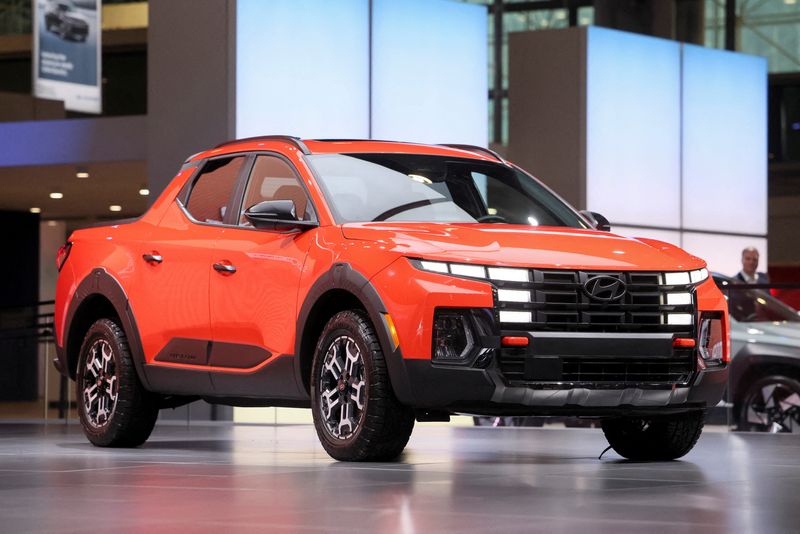By David Shepardson and Jack Kim
NEW YORK/SEOUL (Reuters) -Hyundai Motor Group said on Wednesday it will invest 68 trillion won ($51 billion) over three years in South Korea to ramp up electric vehicle production and new mobility business and separately hire 80,000 new employees, doubling down at a time when other established automakers are slowing efforts.
More than half of the investment, or 35.5 trillion won, will be allocated for new research and development infrastructure and assembly lines for EVs, the automaker said in a statement.
"We are doubling down on electrification," Hyundai global Chief Operating Officer Jose Munoz said in an interview at the New York auto show. "We're very committed to the United States market."
In the U.S., Hyundai said in November it was investing $12.6 billion for new dedicated EV and battery manufacturing facilities in Georgia - the largest investment outside South Korea.
Hyundai Motor (OTC:HYMTF) Group includes flagship Hyundai Motor and its affiliate Kia, which together are the world's number three automaker by sales. Auto parts maker Hyundai Mobis and Hyundai Engineering & Construction are also under the conglomerate.
Hyundai's new round of EV investment comes as rival automakers are slowing plans to expand EV production, and shifting capital to hybrid models or bigger share buybacks and dividends for investors.
In 2021, General Motors (NYSE:GM) said it planned to spend more than $35 billion on EV projects through 2025, and would prioritize accelerating EVs over near term profits. But last year, the U.S. automaker delayed a planned electric truck factory and slashed its projected EV output.
GM last year said it would spend $10 billion to buy back shares, and CEO Mary Barra has indicated there could be more buybacks. Stellantis (NYSE:STLA) has also promised to return more cash to shareholders rather than increase investments in EVs.
Ford (NYSE:F), which three years ago outlined $30 billion in EV spending through 2030, has since slashed production plans for its F-150 Lightning electric truck and shifted workers to build more gasoline-powered Bronco SUVs. Ford is now "right-sizing the capacity and investments we are putting into EVs," Chief Financial Officer John Lawler said Tuesday.
Toyota (NYSE:TM), the world's largest automaker by vehicle sales, is adding more EVs to its lineup, but the Japanese automaker has put more emphasis on increasing sales of gas-electric hybrids. Investors have cheered that choice, sending Toyota shares up nearly 50% so far this year.
Munoz said Hyundai also sees a slowdown in the pace of electrification, but added the Korean automaker will maintain its plans but remain flexible, including the rollout of plug-in hybrid vehicles.
Hyundai on Wednesday showed off its 2025 Tucson SUV and will launch both hybrid and plug-in hybrid versions this summer.
"The only difference is we still see EVs in the long run as the way we are going to see the biggest growth," he said.
Hyundai expects to begin producing EVs in Georgia in October to allow them to qualify for $7,500 tax credits under the Inflation Reduction Act - ahead of its initial schedule, Munoz said. Hyundai, which saw U.S. EV sales double last year, will soon announce what EVs it will build in Georgia, he added.
Among the projects encompassed in the new investment plan announced Wednesday are the overhaul of a Kia factory for production of a compact EV that will be "produced and sold domestically and internationally."
In 2025, a second factory will start producing "PBV" vehicles - a reference to a purpose-built EV. Hyundai showed prototypes of PBVs used as commercial vehicles at this years CES show in Las Vegas.
Hyundai's Ulsan factory will begin mass producing "ultra-large" Genesis luxury EVs in the first quarter of 2026, the company said.

Hyundai said in South Korea another 31.1 trillion won will be slated for research and development in electric vehicles, including software-defined vehicles (SDVs) and battery technology, and most jobs created will be to promote future business.
($1 = 1,343.500 won)
